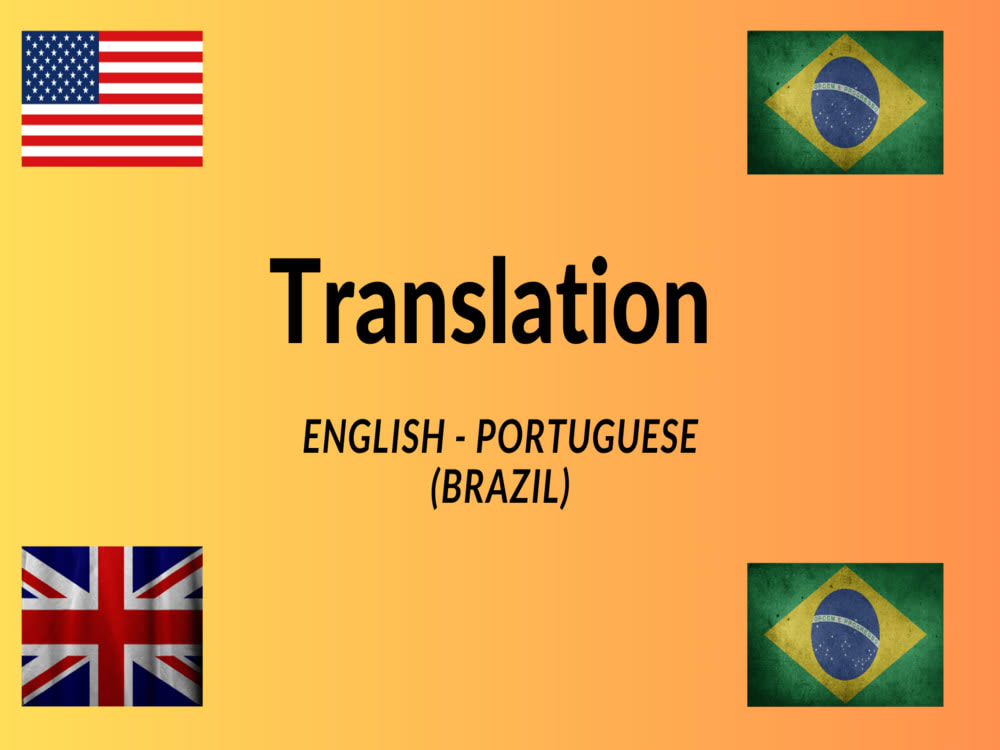The Significance of Specialist English To Portuguese Translation Solutions
The Significance of Specialist English To Portuguese Translation Solutions
Blog Article
Leading Tips for Perfect English to Portuguese Translation Solutions
Attaining remarkable English to Portuguese translation needs greater than plain word-for-word conversion; it requires an understanding of etymological ins and outs and cultural nuances. Selecting qualified translators who are both well-versed and culturally conscious is critical. Just as crucial is the technique of localization, which involves customizing content to local variants. In addition, using contextual recommendations guarantees that the original tone and meaning are preserved. The trip does not end there; a strenuous review and editing procedure is necessary. What other critical aspects should be thought about to boost translation high quality even more?
Understand Cultural Nuances
When translating from English to Portuguese, understanding the cultural nuances is crucial for creating a resonant and exact message. The Portuguese-speaking world is varied, incorporating different areas, each with its distinctive customizeds, idioms, and social norms. A translator needs to be in harmony with these nuances to guarantee that the translation not just shares the intended message but additionally reverberates with the target audience.
As an example, idiomatic expressions in English might not have direct counterparts in Portuguese. An expression that works well in one culture might cause confusion or false impression in one more. Understanding local languages and variants, such as those found in Brazil and Portugal, is important; words might hold various undertones or uses depending on the location.
Additionally, social context plays a considerable role in translation. Consideration of historic, social, and political variables can affect language options and tone. This social understanding enables the adjustment of web content that straightens with regional worths and assumptions, thereby enhancing the effectiveness of interaction. Inevitably, a thorough understanding of cultural subtleties is essential for delivering translations that are not only linguistically accurate yet likewise culturally relevant and appealing.
Select Certified Translators
Selecting qualified translators is a crucial step in guaranteeing the accuracy and quality of English to Portuguese translations. A translator's proficiency not only includes language efficiency however also a deep understanding of social context, colloquial expressions, and industry-specific terms. When selecting a translator, focus on those with formal training in translation researches or linguistics, along with relevant accreditations that show their expert skills.
Experience plays an essential function too; translators concentrating on certain fields-- such as lawful, clinical, or technological-- are more probable to deliver specific translations tailored to the industry's criteria (English To Portuguese Translation). Additionally, consider their profile and customer testimonies to assess their previous work high quality and integrity
Engage translators that are indigenous Portuguese audio speakers, as they have an inherent understanding of the language's nuances and regional dialects. This knowledge improves the translation's authenticity and performance.
Usage Contextual Referrals

When equating, it is important to recognize colloquial expressions and social recommendations that might not have direct matchings in Portuguese. Specific expressions that resonate in English could require adjustment to convey the very same emotional weight or social significance in Portuguese. Using contextual recommendations can help translators select the best terms and style, thus boosting the total clarity and impact of the translation.

Focus on Localization
Localization plays an important function in the translation process from English to Portuguese, as it guarantees that the translated content is pertinent and culturally ideal to the target market. English To Portuguese Translation. This procedure surpasses mere translation; it involves adjusting the web content to the social, social, and linguistic nuances specific to Portuguese-speaking areas
Recognizing neighborhood expressions, custom-mades, and preferences is important. Specific phrases or references that resonate with an English-speaking target market might not have the same impact on Portuguese speakers. It have a peek at these guys is vital to consider local variations, such as Brazilian Portuguese versus European Portuguese, as each has distinctive vocabulary and stylistic distinctions.
Furthermore, localization includes format, such as date and time formats, money, and measurement units, which can vary considerably across societies. This interest to detail cultivates a connection look at this now with the audience, improving engagement and understanding.
Moreover, using local languages and slang can give authenticity, making the material more relatable. By focusing on localization in English to Portuguese translation, organizations can effectively interact their message, construct trust with their audience, and eventually attain their intended objectives.
Evaluation and Edit Extensively
Detailed review and modifying are crucial actions in the translation process, particularly when converting English web content into Portuguese. This stage ensures that the equated product not only maintains the initial meaning but likewise resonates well with the target audience. Provided the etymological and social subtleties, a thorough strategy to review and editing is important.
Begin by comparing the original English text with the Portuguese translation, paying very close attention to tone, terminology, and context. It's vital to ensure that social references and idiomatic expressions are suitably adapted for the Portuguese audience. Engaging a 2nd translator or an indigenous audio speaker for this testimonial process can provide invaluable insights and catch errors that may have been overlooked.
Additionally, check for grammatic precision and stylistic uniformity throughout the paper. Typical difficulties such as uncertain phrases or false cognates should be addressed this page to avoid misinterpretation.
Final Thought
Accomplishing exceptional English to Portuguese translation services necessitates a comprehensive approach that incorporates understanding cultural subtleties, picking qualified translators, utilizing contextual references, focusing on localization, and performing thorough reviews and edits. Each element plays a vital role in ensuring that translations are not just exact however also resonate with the target audience. By executing these strategies, organizations can boost the effectiveness of their interaction and foster a much deeper link with Portuguese-speaking audiences.
Achieving exceptional English to Portuguese translation needs more than simple word-for-word conversion; it demands an understanding of social nuances and etymological ins and outs.Picking qualified translators is a crucial action in making sure the accuracy and top quality of English to Portuguese translations.Thorough testimonial and modifying are important actions in the translation procedure, especially when transforming English web content into Portuguese.Begin by comparing the initial English text with the Portuguese translation, paying close focus to tone, context, and terminology.Achieving phenomenal English to Portuguese translation services necessitates an extensive technique that incorporates understanding social subtleties, selecting qualified translators, utilizing contextual recommendations, focusing on localization, and performing comprehensive evaluations and edits.
Report this page